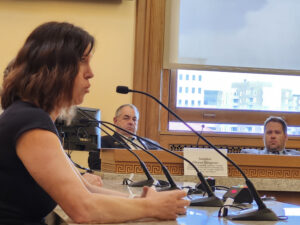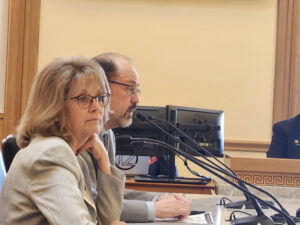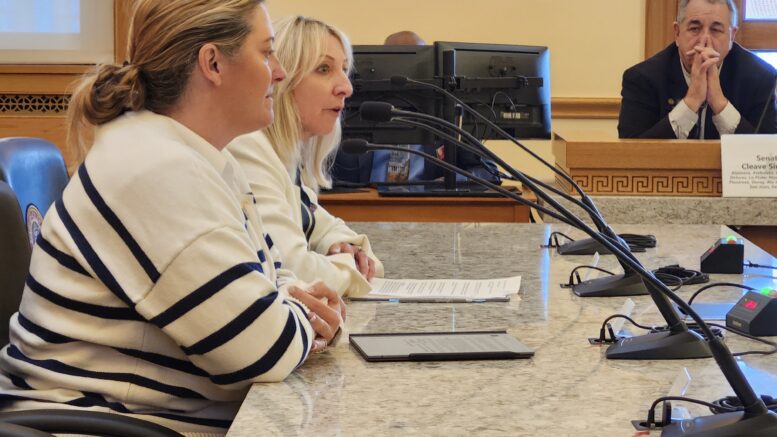Signs of overregulation are rampant for Colorado businesses, from the 459 days it takes to get an air-quality permit to the 43 major energy-related rulemakings conducted in the past seven years. A study identified the state as the sixth-most-regulated in the country.
So, on Thursday, leaders at the Colorado Chamber of Commerce pitched to a Senate committee what they called a reasonable way to ensure that the state is regulating employers sensibly. Senate Bill 306, sponsored by Democratic Senate Majority Leader Robert Rodriguez of Denver and Republican Sen. Barbara Kirkmeyer of Brighton, would require the state auditor to conduct performance audits on two major divisions of state government a combined four times in the next seven years.
Colorado Chamber President/CEO Loren Furman said her organization chose the agencies — the Air Pollution Control Division and the Division of Labor Standards and Statistics — because a study found they have a disproportionate number of regulations compared to other states. APCD, housed in the Colorado Department of Public Health and Environment, oversees air-quality rules; DLSS, located in the Department of Labor and Employment, enforces wage-theft, sick-leave and unfair-labor-practice laws, among others.
SB 306 calls for the state to determine whether both divisions, which do not get audited like other agencies on a regular schedule, are “effectively and efficiently performing and fulfilling the division’s statutory obligations.” APCD audits would happen in 2026 and 2031, while the DLSS would go under the auditor’s microscope in 2027 and 2032.
Concern from certain groups over audits
“This is a very straightforward bill,” Furman told committee members during the first hearing for SB 306 on Thursday afternoon. “We believe this is long overdue. And we trust the state auditor’s team to do this.”
A coalition of environmental and labor organizations, however, said the bill is unneeded and that, despite the bipartisan sponsorship team, it seems overly political. Several witnesses, such as Colorado Sierra Club conservation committee chairman Ramesh Bhatt, criticized the timing of the bill as particularly poor while Elon Musk and his Department of Government Efficiency is firing thousands of federal regulatory employees.
Lauren Swain, Colorado coordinator for Physicians for Social Responsibility, questioned why the state would target APCD, its primary arm for air-quality regulation, at a time when protection of public health is needed more than ever. Colorado AFL-CIO lobbyist Kjersten Forseth felt similarly about the focus on DLLS, noting it enforces laws that business groups tend to oppose, which makes the audits feel targeted against agencies that keep employers in check.
“These are the areas where businesses do get regulated, and that is because this is where employees get exploited,” Forseth said in testifying against SB 306. “What I will not engage in is a wholesale attack on the one agency that’s there to protect workers.”

Colorado AFL-CIO lobbyist Kjersten Forseth testifies Thursday against Senate Bill 306
Bill came from years of business concerns
Attempting to refute the efforts to link SB 306 to DOGE, Furman noted that the Colorado Chamber has been working on regulatory reform for three years as research has shown it’s become employers’ biggest obstacle to growing in this state. In a survey released in February, 48% identified regulations as their most important issue to fix, with 67% of manufacturers affixing that label on it and 67% of overall businesses saying they believe the state’s economy is on the wrong track.
A chamber-commissioned study performed by Maryland-based market-research and regulatory-analysis firm StratACUMEN group found that with nearly 200,000 unique regulations, Colorado has more than all but five other states. The number of regulations grew 7.1% between 2020 and 2023, and a full 45% of those regulations are duplicative or redundant, the study found.
Chamber leaders began working last fall on two bills that would require closer scrutiny of the state’s regulations — the one introduced as SB 306 and another that would have required the auditor to review the efficacy of all regulations passed in the last 10 years. That latter bill, which is not set to move forward right now, would have been based upon an existing law that’s required the Office of the State Auditor to review every state tax break to see if it’s serving its intended purpose — and has led to repeal of several tax credits.
But chamber leaders ran into the types of pushback that bill opponents outlined on Thursday. Bhatt said it was unfortunate “to see a bill that questions the work of hard-working state employees,” and Colorado Plaintiffs Employment Lawyers Association board member David Lichtenstein said he failed to see the purpose of the audits “other than to hobble the agency whose primary interest it is to protect workers’ rights.”
Last-minute feedback delays vote
While Furman said that she had sought feedback on potential changes to the scope of the audits, she told committee members that she got suggestions from opponents, including the AFL-CIO, just an hour before the hearing began. Among them were requests to help define the purpose of the audits with questions about whether the agencies have been sufficiently staffed and funded, what the average tenure of agency workers is and whether the division is meeting its legislative function.
As a result, Kirkmeyer and Rodriguez asked the committee to hold off a vote on the bill until its next meeting, which likely will come on Tuesday, just eight days before the May 7 adjournment of the legislative session. That will give proponents time to discuss potential amendments to see if they get some sort of consensus on a bill that now includes 11 Senate sponsors and cosponsors on both sides of the aisle.

Colorado state Sens. Barbara Kirkmeyer and Robert Rodriguez explain Senate Bill 306 to a committee on Thursday.
But backers also said there is ample evidence that the state needs to look into the practices of the two highly regulatory departments — not to automatically cut regulations but to ensure that rules aren’t redundant and that they are being overseen efficiently.
Chamber: Audits justified by current practices
Kirkmeyer, for example, noted that that Senate Bill 19-181, the bill that boosted regulation of the oil and gas industry significantly, ordered at least 13 rulemaking processes, yet the state has to examine whether they are fulfilling their purposes.
And Christy Woodward, chamber regulatory affairs advisor, noted that the average time it takes for APCD to issue an air-quality permit has risen from 165 days in 2019 to 459 days in 2024 despite the addition of hundreds of new employees — a situation begging inspection. That ramp-up has come as she’s participated in 43 major energy-related rulemakings since 2018, some of which she argued conflict with each other and could hamper the state’s big-picture goal to reduce greenhouse-gas emissions.
“This deters investments and pushed projects into other states,” Woodward said. “I think an audit can only help them to be more efficient.”
